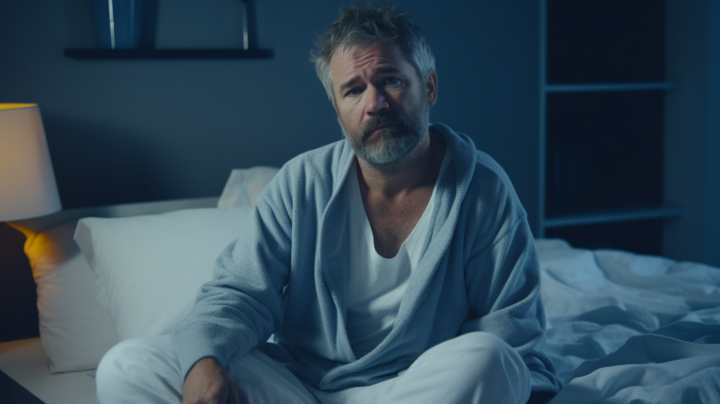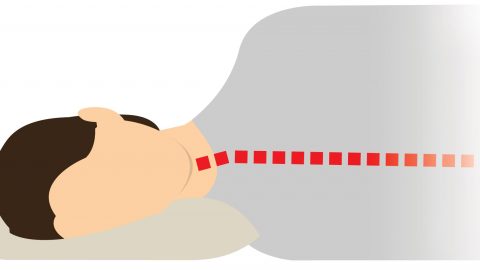
My wife and I stayed overnight at my sister’s house last weekend. My sister enthusiastically pointed to the new Casper mattress in the guest bedroom. “We just got this, let me know what you think!”
It seemed great at first, but late that night I woke up with an ache in my hip. Like most people, I’m a side sleeper, so I just rolled over to relieve the discomfort. Unfortunately after an hour or two, I woke up again with an ache in my other hip. All night I tossed and turned.
While lying awake, I wondered if I should try sleeping on my back. I’d tried to change my sleep positions before, without much luck. I gave it a go, but got a quick elbow from my wife. “You’re snoring!”
When I got home, I did some research. Why did this particular mattress make my hips hurt? It seemed perfectly comfortable when I went to bed that night.
After some reading, I learned that both firm and soft mattresses can cause hip pain. Nothing is ever simple…
Firm Mattress Hip Pain
Many prefer a firm mattress because they believe it offers better support. However, sleeping on an excessively firm mattress, especially if you’re a side sleeper, can lead to hip pain. The firm surface creates pressure points on your hips, restricting blood flow and causing discomfort. This pressure can often lead to pain, numbness, and tingling in the hip area. Fortunately, this type of discomfort typically dissipates quickly when you change your sleeping position or adjust your mattress.
Soft Mattress Struggles
On the other end of the spectrum, sleeping on an overly soft mattress can also contribute to hip pain. A soft mattress allows your hips to sink too deeply, causing your hips to flex outside of their natural range of motion. This deviation can lead to misalignment issues, which can result in pain and stiffness over the course of the night. Unlike pressure point pain, the discomfort caused by alignment issues may not become noticeable until you have slept for a few hours or wake up in the morning.
Hip pain from side sleeping can be resolved with a softer or firmer mattress.
I couldn’t tell if my sister’s new memory foam mattress was too soft or too firm for me. It felt great when I initially climbed into bed. Even when the ache set in, I wasn’t sure what was causing it.
When I returned home to my own supremely-comfortable mattress (a really old Kingsdown), it became evident that the Casper mattress was firmer, mostly b/c it was lacking the soft pillow top that my mattress had. Thus I had to conclude that my body needs a softer mattress type. That’s a good thing to know, b/c my wife just ordered a king-size frame and we’ll be in the market for a good mattress in a few weeks!
Finding the Right Balance
So, what’s the solution? Unfortunately it’s not a simple task to find the right mattress. There is no single type that’s just right for everyone. Here are some tips to help you choose the right one:
- Consider Your Sleep Position: Your preferred sleep position plays a significant role in determining the ideal mattress firmness for you. Side sleepers like myself often require a softer mattress to cushion the hips, while back or stomach sleepers might benefit from a firmer surface.
- Test Before You Invest: Before making a purchase, take the time to test out different mattresses in a showroom. There’s no substitute for trying it in person. Lie down in your typical sleep positions and gauge the comfort level to determine if it suits your needs. While many of the internet retailers will take returns, it’s often not easy and the mattresses often end up in a landfill.
- Pay Attention to Support: A mattress should provide adequate support to maintain proper spinal alignment (straight and parallel to the ground) while allowing your hips and shoulders to sink slightly for pressure relief. Look for a mattress that maintains this balance.
- Read Reviews: Online reviews and testimonials from other consumers can provide valuable insights into how different mattresses perform in terms of comfort and support.
- Consult with a Professional: If you’re experiencing chronic hip pain, it’s advisable to consult with a healthcare professional or orthopedic specialist who can offer guidance on the best mattress for your specific needs.
Hip pain from sleeping is a common issue that can often be traced back to the mattress you sleep on. Whether it’s the pressure points caused by a firm mattress or the misalignment from a soft one, finding the right balance is key to a restful night’s sleep. By considering your sleep position and testing mattresses before purchasing, you can make an informed choice that supports your hip health and overall well-being. Remember, the path to better sleep and less hip pain begins with the right mattress.



